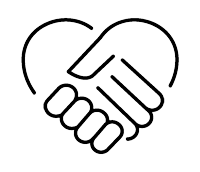
ROCK thru invisible disability at work
Part 2: Empower others
by Lee Havenga | January 26, 2023
A big challenge of invisible illnesses is that they are, well, invisible. If you don’t know that someone is suffering, how can you help? You can leave the door open for vulnerability with consistent actions that display acceptance.
RESPECT

In our challenges, we need to be supported, not shunned.
Apply it
Because we live in a culture where illness is synonymous with weakness, a person must gather tremendous emotional strength to ask for support. The “productivity is king” attitude leaves people feeling unworthy when they may need to take a different approach to contribute at work. They are already dealing with physical challenges that likely include fatigue, pain, and sleep deprivation. But because we are whole beings, these struggles quickly trigger emotional stress caused by realistic fears. Fear of being unable to support themselves financially, becoming a burden, disease progression, and even being in public. Many people with chronic illness may just need a few aids to continue their productivity. Treating all people like they have unconditional value allows those who have a silent disability to trust enough to know that sharing their illness will get support, not shunned.
OWNERSHIP

Solutions come only after, first, seeking understanding of the problem.
Apply it
Consider a one-on-one check-in to understand the situation if you notice consistent behaviors from a colleague interrupting productivity or morale. Identify the problematic pattern, how it impacts the work, and your willingness to find a solution. Then ask if there are reasons causing the behavior that you can support. It might sound like this, “I’ve noticed that you’ve been late to the last several team meetings. You’re a critical part of the team, so we can only start with you, and waiting carves into our collaboration time. I want to help you find a solution. Is there something going on that is preventing you from getting to the meeting on time?
CONNECTION

Give everyone empathy as if they are silently suffering because, in one way or another, they probably are.
Apply it
Assess your current approach and make changes to let your colleagues know that you are safe to share their invisible illness with.
Do your daily actions demonstrate that you accept people, despite their challenges ?
Are you showing that you welcome different approaches to reaching a goal?
Do your actions display that you collaborate to help teammates overcome difficult circumstances?
KINDNESS

Model vulnerability to foster trust from others.
Apply it
No one wants to be the lone wolf when it comes to self-care. Although opposite from the truth, our society often sees this as weak and unproductive. Lead the pack by intentionally modeling self-awareness and self-care. Here are a few examples:
“I get hangry, so I carve out time for a lunch break every day and have more focus for the rest of the afternoon.”
“Eight hours of video conferencing fatigues me, so I go off-camera for some of my meetings, which helps me recharge and be more engaged.”
“I get stuck in a rut when I sit at my desk all day, so I set a timer to take a 10-minute walk twice a day. Once I started doing this, I could do more work in less time.”
Also, look for opportunities to show how self-care has positive outcomes:
Colleague 1: You were really articulate and concise in that meeting.
Colleague 2: Thanks, I felt really focused after a solid 8-hours of sleep last night.
Read Part 1 in the series
Get more like this, right to your inbox
Want to inspire a friend?
Forward this on so they can
ROCK thru too!


